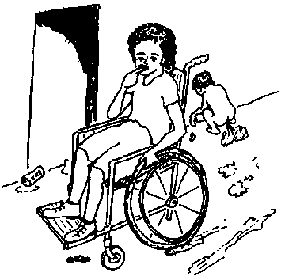CHAPTER 6
A Mudguard for Dalia
DALIA is a lovely 5-year-old who is developmentally
delayed. Her mother brought her to PROJIMO to see if anything could be done
to help her "learn to walk and talk."
On observing Dalia's responses to people and things around her, the
PROJIMO team felt the child had a lot more potential than she had realized.
She seemed quite alert - but her attention span was short. She would play
with a toy for a moment, then drop it. She was beginning to speak a few
words, but she had trouble pronouncing them.
Physically, Dalia had difficulty with hand control and with balance.
She had a lot of spasticity, mostly in her lower body. She could not stand,
even with assistance.
Dalia's mother explained that, as a single working mother, she often
had little choice but to leave her daughter alone at home for long periods.
For her safety, she locked Dalia in a small room. "I'd like to take her out
with me and do more fun things with.her, like visit friends who have
children," she said. "But she can t walk and she's getting heavy."

Mari - a wheelchair rider herself - thought a wheelchair might help. She
had Dalia try a variety of children's chairs at PROJIMO, to see if any
suited her. One small second-hand wheelchair fit her well. Dalia loved it!
She made a great effort to roll it by pushing on its wheels. Time and again,
her mother said, "Use the hand rims!" But Dalia kept pushing the wheels.
(They were easier to grip.) When at last she rolled the chair forward,
everyone cheered. Here was a disability aid that held the child's
attention, that helped to improve her hand control, that could stimulate
interaction outside the home, and that gave her greater independence - all
in a form she enjoyed and might well persist with.

Dalia's mother foresees a danger. Dalia's mother
recognized the benefits of the wheelchair. But she was worried. "I won't
dare take her outside in it!" She explained that they lived in a slum on the
edge of the city. The dirt alleys were full of garbage and "doo-doo."
"You see, Dalia always puts her fingers in her mouth. Now that she's
discovered she can move in her wheelchair, she'll always have her hands on
its wheels! Filth from the street is sure to end up in her mouth and make
her sick. Her health is already delicate."
For this reason, Dalia's mother preferred to use a stroller from PROJIMO.
It was rather like a baby buggy and, in it, Dalia would lie back passively,
unable to reach the small wheels. Mari, a leader at PROJIMO, explained how
important it was for Dalia's development that she sit upright, facing
forward, to interact with her surroundings. She also explained that, as
Dalia rose to the challenge of moving her chair independently, this would
help her develop better hand and arm control and self-confidence, and it
would open new social (and developmental) horizons for her. This might, in
turn, help her improve her speech.
But Dalia's mother stiil worried about the filth from the street. "I
guess I just won't be able to take her outside in the wheelchair," she
sighed, "unless there's some way to keep her hands off the wheels when we
pass through filthy areas." |